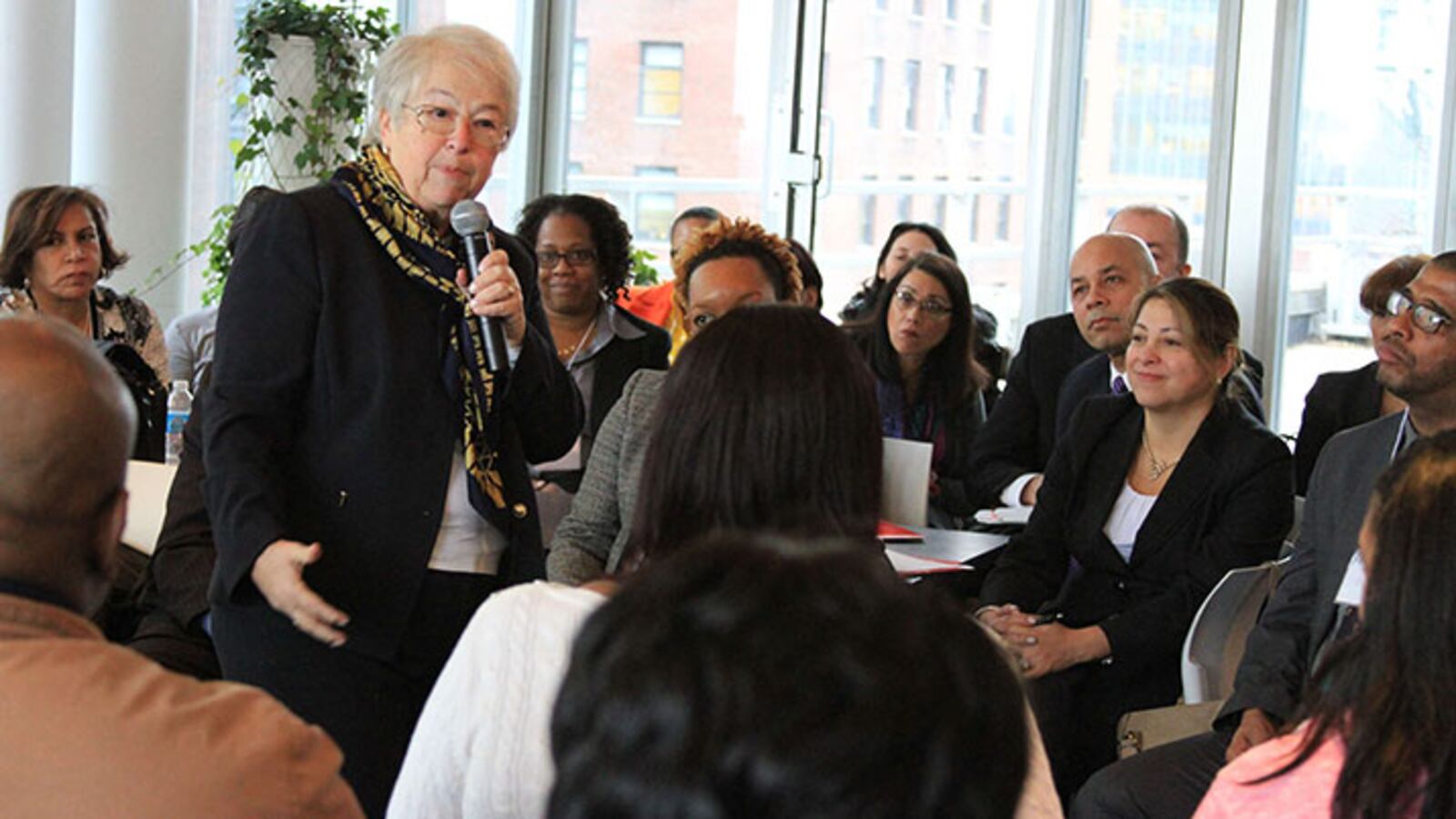Officially, principals are still awaiting word from the city about the future of “networks,” the Bloomberg-era support teams designed to help principals do everything from train teachers to manage budgets.
But to many, the writing is on the wall: Networks as they know them are finished.
Perhaps the clearest sign of this, according to several principals and network officials, is the resurgence of superintendents, the education department field commanders who were sidelined by the previous administration in an attempt to give principals greater autonomy. Under Chancellor Carmen Fariña, the superintendents have been rehired and retrained, and are now meeting individually with principals, weighing in on instructional matters, and hosting training sessions — activities that until now had been under the purview of networks.
Meanwhile, some school and network leaders say they have heard that networks could soon lose their role assisting schools with budget and operational issues, leaving them as little more than coaches, or “professional developers,” in school parlance. While Fariña is not slated to announce her new system for supporting schools until next month, she appeared to confirm some of the speculation about the networks’ diminishing authority in an interview Monday.
“I think the people in networks who are professional developers will be professional developers. We’re never going to lose that,” she told Chalkbeat. But she added that superintendents, whose main reason for visiting schools in recent years has been to rate principals, will now play a much greater part in guiding them.
“I think having the person who evaluates you be the person who supports you is very important, and that’s really what the superintendents will be doing,” she said.
The network system’s many critics, including some principals who find them ineffective, welcome the changes. But some who cherish their self-selected networks, which offer assistance to principals but can’t command or sanction them, dread the return to a superintendent-led system.
“A lot of us are nervous,” said one principal, who like other school and network leaders would only speak anonymously about possible policy changes. “The signs point to networks may no longer exist — certainly not in this form.”
After several reorganizations, the Bloomberg administration eventually settled on a system of nearly 60 support networks, which principals could choose from and that took over many of the duties once overseen by superintendents. The superintendents technically remained principals’ bosses, but their role was reduced mainly to conducting formal evaluations and their staffs shrank from dozens to a handful.
Under Fariña, herself a former superintendent, that position is regaining its clout.
After forcing them to reapply for their jobs this summer (more than a third were replaced), Fariña began to hold hour-long, one-on-one meetings with each of the more than 40 superintendents to explain their revamped roles. They were given new responsibilities — interact with parents, promote arts education, ensure that quality teaching happens in schools — and told to act as “the eyes and ears of the chancellor.”
“To me, the superintendents are huge,” Fariña said Monday. “Having people in the field that I can trust, that have my same belief system, that are going to be in schools all the time, is important.”

The superintendents have started to hire new staffers, including instructional experts to help evaluate the 60 or so schools that some superintendents oversee. They have also started to host district-wide meetings, which all but disappeared under the network system. While the meetings vary by superintendent, some principals have complained about ones held during the school day, where some say they have sat through talks by curriculum vendors and, in one case, Miss New York.
“I can’t speak enough to the lack of quality or purpose” at those meetings, one principal said.
Principals who value their networks worry that the rise of superintendents may signal the decline of networks.
To those principals, the network system empowered them to choose the type of support they wanted from experts who, unlike superintendents, would not also evaluate them. They also enabled school leaders in the same network to interact with like-minded colleagues outside their geographic districts. One principal in a high-needs Brooklyn district said she not only gets advice from her counterparts who lead successful schools in better-off districts, but also receives donated books and furniture from them.
“I’ve gotten an immense amount of support from other principals in my network,” the school leader said.
Predictably, some network officials are upset by the changes.
Some say that principals are now receiving dueling messages from networks and superintendents about how to run their schools, but that the school leaders feel compelled to defer to the will of their bosses, the superintendents. They also say that network staffers are starting to consider new jobs.
“There are a number of people on network teams who are being recruited to central jobs,” one network leader said, referring to positions within the city education department. “There are other people who are actively looking.”
Of course, the network system’s many critics — including some state officials and union leaders — have called for an overhaul since before Fariña was appointed.
They argue that some networks are spread too thin trying to assist schools in multiple boroughs, while others let struggling schools limp along without extra help. Others say the system leaves principals without clear supervisors and parents without officials they can appeal to.
Genevieve Stanislaus, principal of Life Sciences Secondary School in the Upper East Side, said the network system is “too scattered,” adding it can keep principals in the same neighborhood who are in different networks from collaborating. During her 34 years working in the school system, the most help she ever received was from her one-time superintendent, she said.
“He knew every one of his 41 schools, and his deputy visited even more often,” she said. “They were always there to support you and assist you.”

